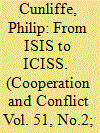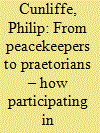|
|
|
Sort Order |
|
|
|
Items / Page
|
|
|
|
|
|
|
| Srl | Item |
| 1 |
ID:
145732


|
|
|
|
|
| Summary/Abstract |
In light of the post-intervention crisis in Libya, this article revisits critically the vision of the Responsibility to Protect (R2P) offered in the 2001 report of the International Commission on Intervention and State Sovereignty (ICISS) – frequently taken as the conceptual bedrock for R2P doctrine. It is argued that the perverse effect of ICISS doctrine is to replace political responsibility with paternalism. The demand that states be made accountable to the international community ends by making states accountable for their people rather than to their people. The argument is developed across five critical theses. These include claims that R2P changes the burden of justification for intervention, that it usurps popular sovereignty in favour of state power, and that it diffuses post-conflict responsibilities. The article concludes that pre-emptive ‘human protection’ efforts risk crowding out questions of systemic transformation, i.e. what kind of an international order we want to live in.
|
|
|
|
|
|
|
|
|
|
|
|
|
|
|
|
| 2 |
ID:
159974


|
|
|
|
|
| Summary/Abstract |
This article provides a heuristic study of three cases where participation in peacekeeping operations prompted military rule in the peacekeeper-contributing state. These three atypical cases contradict the theory of diversionary peace, which claims that contributing to peacekeeping operations abroad should stimulate democracy at home. The experience of these three countries also calls into question the conventional wisdom that strongly associates peacekeeping with liberal democratic institutions, outcomes and practices. Via triangulation across literature, reports, elite interviews and WikiLeaks cables, these cases are examined in order to identify more generalisable observations regarding how participation in peacekeeping may enhance the role of the military at the expense of democratic order and civilian rule in the contributing state. The theory of diversionary peace is shown to suffer from serious conceptual flaws. Some preliminary efforts are made to generalise the findings, with Ghana and Uruguay identified as warranting further investigation. A number of variables are identified as offering scope for generalisation, namely, revenue, leadership and military size. Several promising areas for further research are also identified: how military dependence on peacekeeping may make political systems more permeable to outside influence, how far the United Nations (UN) can politically influence its contributor states and how peacebuilding may affect peacekeepers’ understanding of their role in their own countries. By examining the feedback effects of peacekeeping on peacekeeper-contributing states, the article reverses the conventional focus of peacekeeping scholarship and contributes to the growing literature examining the wider ramifications and unintended consequences of liberal conflict management.
|
|
|
|
|
|
|
|
|
|
|
|
|
|
|
|
| 3 |
ID:
089342


|
|
|
|
|
| Publication |
2009.
|
| Summary/Abstract |
This article examines the allocation of roles and responsibilities in the construction of UN peacekeeping. The case is made that decision making in UN peacekeeping is not only fragmented between various states and institutional actors, but also critically lopsided, with an uneven distribution of responsibilities and the majority of political, military and strategic risks falling upon those countries least able to bear them - poor and weak states. States that hold decision-making power are not the states that have to implement those decisions. The article concludes by arguing that this governance structure is not a symptom of organizational dysfunction, but that it serves a political function by allowing influence to be wielded without risk.
|
|
|
|
|
|
|
|
|
|
|
|
|
|
|
|
| 4 |
ID:
075904


|
|
|
|
|
| Publication |
New York, University College London, 2007.
|
| Description |
xiii, 208p.
|
| Standard Number |
9780415418072
|
|
|
|
|
|
|
|
|
|
|
|
Copies: C:1/I:0,R:0,Q:0
Circulation
| Accession# | Call# | Current Location | Status | Policy | Location |
| 052118 | 320.15/BIC 052118 | Main | On Shelf | General | |
|
|
|
|
| 5 |
ID:
151293


|
|
|
|
|
| Summary/Abstract |
The papers in this special section are the results of two workshops that were held in 2014, both organized by the editors of this special section. The first workshop was financed by a Venture Research Grant from the International Studies Association and held at that organization’s Annual Convention in Toronto in March 2014. The second was held in Rio de Janeiro in September of that year, under the auspices of the Institute of International Relations of the Pontifical Catholic University of Rio de Janeiro (IRI/PUC-Rio). Both workshops were concerned with mapping out in both conceptual and empirical terms how a new generation of emerging powers were attempting to reshape the international order. Much has changed over the last two years since those workshops took place. While there were storm clouds on the horizon even back then, at the time of writing virtually all the emerging powers find themselves mired in significant difficulties that will weigh down and perhaps in some cases even snap their upwards ascent.
|
|
|
|
|
|
|
|
|
|
|
|
|
|
|
|
| 6 |
ID:
115320


|
|
|
|
|
| Publication |
2012.
|
| Summary/Abstract |
The sheer ambition and scale of UN peacebuilding today inevitably invokes comparison with historic practices of colonialism and imperialism, from critics and supporters of peacebuilding alike. The legitimacy of post-settlement peacebuilding is often seen to hinge on the question of the extent to which it transcends historic practices of imperialism. This article offers a critique of how these comparisons are made in the extant scholarship, and argues that supporters of peacekeeping deploy an under-theorized and historically one-sided view of imperialism. The article argues that the attempt to flatter peacebuilding by comparison with imperialism fails, and that the theory and history of imperialism still provide a rich resource for both the critique and conceptualization of peacekeeping practice. The article concludes by suggesting how new forms of imperial power can be projected through peacebuilding.
|
|
|
|
|
|
|
|
|
|
|
|
|
|
|
|
|
|
|
|
|